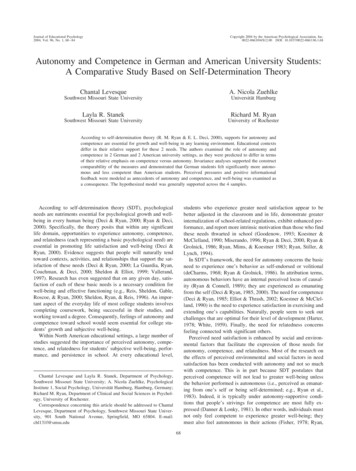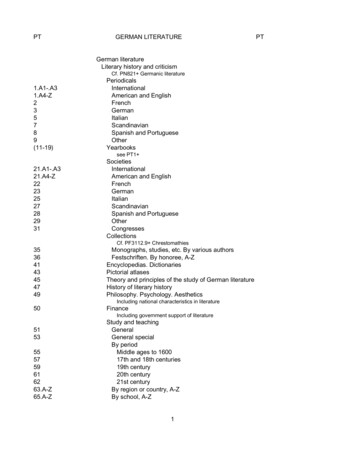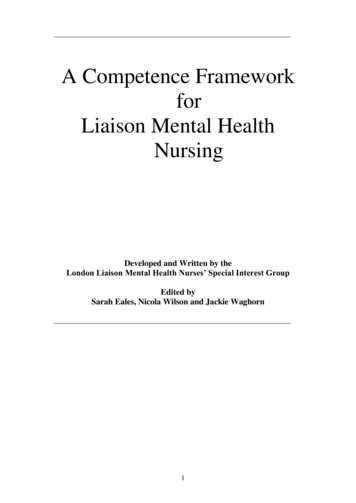
Transcription
Journal of Educational Psychology2004, Vol. 96, No. 1, 68 – 84Copyright 2004 by the American Psychological Association, Inc.0022-0663/04/ 12.00 DOI: 10.1037/0022-0663.96.1.68Autonomy and Competence in German and American University Students:A Comparative Study Based on Self-Determination TheoryChantal LevesqueA. Nicola ZuehlkeSouthwest Missouri State UniversityUniversität HamburgLayla R. StanekRichard M. RyanSouthwest Missouri State UniversityUniversity of RochesterAccording to self-determination theory (R. M. Ryan & E. L. Deci, 2000), supports for autonomy andcompetence are essential for growth and well-being in any learning environment. Educational contextsdiffer in their relative support for these 2 needs. The authors examined the role of autonomy andcompetence in 2 German and 2 American university settings, as they were predicted to differ in termsof their relative emphasis on competence versus autonomy. Invariance analyses supported the constructcomparability of the measures and demonstrated that German students felt significantly more autonomous and less competent than American students. Perceived pressures and positive informationalfeedback were modeled as antecedents of autonomy and competence, and well-being was examined asa consequence. The hypothesized model was generally supported across the 4 samples.students who experience greater need satisfaction appear to bebetter adjusted in the classroom and in life, demonstrate greaterinternalization of school-related regulations, exhibit enhanced performance, and report more intrinsic motivation than those who findthese needs thwarted in school (Goodenow, 1993; Koestner &McClelland, 1990; Miserando, 1996; Ryan & Deci, 2000, Ryan &Grolnick, 1986; Ryan, Mims, & Koestner 1983; Ryan, Stiller, &Lynch, 1994).In SDT’s framework, the need for autonomy concerns the basicneed to experience one’s behavior as self-endorsed or volitional(deCharms, 1968; Ryan & Grolnick, 1986). In attribution terms,autonomous behaviors have an internal perceived locus of causality (Ryan & Connell, 1989); they are experienced as emanatingfrom the self (Deci & Ryan, 1985, 2000). The need for competence(Deci & Ryan, 1985; Elliot & Thrash, 2002; Koestner & McClelland, 1990) is the need to experience satisfaction in exercising andextending one’s capabilities. Naturally, people seem to seek outchallenges that are optimal for their level of development (Harter,1978; White, 1959). Finally, the need for relatedness concernsfeeling connected with significant others.Perceived need satisfaction is enhanced by social and environmental factors that facilitate the expression of those needs forautonomy, competence, and relatedness. Most of the research onthe effects of perceived environmental and social factors in needsatisfaction has been conducted with autonomy and not so muchwith competence. This is in part because SDT postulates thatperceived competence will not lead to greater well-being unlessthe behavior performed is autonomous (i.e., perceived as emanating from one’s self or being self-determined; e.g., Ryan et al.,1983). Indeed, it is typically under autonomy-supportive conditions that people’s strivings for competence are most fully expressed (Danner & Lonky, 1981). In other words, individuals mustnot only feel competent to experience greater well-being; theymust also feel autonomous in their actions (Fisher, 1978; Ryan,According to self-determination theory (SDT), psychologicalneeds are nutriments essential for psychological growth and wellbeing in every human being (Deci & Ryan, 2000; Ryan & Deci,2000). Specifically, the theory posits that within any significantlife domain, opportunities to experience autonomy, competence,and relatedness (each representing a basic psychological need) areessential in promoting life satisfaction and well-being (Deci &Ryan, 2000). Evidence suggests that people will naturally tendtoward contexts, activities, and relationships that support the satisfaction of these needs (Deci & Ryan, 2000; La Guardia, Ryan,Couchman, & Deci, 2000; Sheldon & Elliot, 1999; Vallerand,1997). Research has even suggested that on any given day, satisfaction of each of these basic needs is a necessary condition forwell-being and effective functioning (e.g., Reis, Sheldon, Gable,Roscoe, & Ryan, 2000; Sheldon, Ryan, & Reis, 1996). An important aspect of the everyday life of most college students involvescompleting coursework, being successful in their studies, andworking toward a degree. Consequently, feelings of autonomy andcompetence toward school would seem essential for college students’ growth and subjective well-being.Within North American educational settings, a large number ofstudies suggested the importance of perceived autonomy, competence, and relatedness for students’ subjective well-being, performance, and persistence in school. At every educational level,Chantal Levesque and Layla R. Stanek, Department of Psychology,Southwest Missouri State University; A. Nicola Zuehlke, PsychologicalInstitute 1, Social Psychology, Universität Hamburg, Hamburg, Germany;Richard M. Ryan, Department of Clinical and Social Sciences in Psychology, University of Rochester.Correspondence concerning this article should be addressed to ChantalLevesque, Department of Psychology, Southwest Missouri State University, 901 South National Avenue, Springfield, MO 65804. E-mail:chl131f@smsu.edu68
AUTONOMY AND COMPETENCE IN GERMAN AND U.S. STUDENTS1982). Autonomy-supportive contexts are those that providechoice and opportunity for self-direction and a minimal amount ofpressured evaluations, imposed goals, and demands. Autonomysupportive environments also offer greater positive nondemeaninginformational feedback and a context in which the other person’sperspective is considered (Deci & Ryan, 1985, 2000; Reeve, 1998:Reeve, Bolt, & Cai, 1999; Ryan & Deci, 2000). Autonomysupportive teachers were found to enhance autonomous motivationand desire for challenge in their students (Deci, Nezlek, & Sheinman, 1981; Flink, Boggiano, & Barrett, 1990; Ryan & Grolnick,1986), whereas autonomy-supportive parents had more autonomous children, who were in turn better adjusted in school(Grolnick & Ryan, 1989). The importance of an autonomysupportive social context to enhance feelings of autonomy hasbeen supported at all levels of schooling from elementary education (e.g., Grolnick, Deci, & Ryan, 1997) to college (Black & Deci,2000; Vallerand & Bissonnette, 1992) to postgraduate education(Williams & Deci, 1996).Because SDT postulates that autonomy, competence, and relatedness are psychological needs relevant to all humans, rather thancognitive preferences, it becomes important to assess those needsacross cultures. Consequently, cross-cultural examinations of autonomy and competence have recently emerged. For example, inJapan, Hayamizu (1997) and Yamauchi and Tanaka (1998) haveshown relations between experienced autonomy and competenceand student’s self-determination and well-being. Chirkov andRyan (2001) showed that teacher and parent autonomy supportswere equally important to well-being and self-determined motivation in Russian and American high school students. In Germany,Wild and Krapp (1995) showed that German children with moreautonomy-supportive parents expressed more self-determinationtoward school, felt more competent, and performed better academically. Cross-culturally, the need for relatedness has not receivedmuch attention because it is widely accepted as a basic psychological need relevant to all human beings (Baumeister & Leary,1995; Ryan, 1993).The purpose of the present study is to add to this growing bodyof literature by examining the relevance of the needs for autonomyand competence toward school in German and American samplesof undergraduate college students. To do so, we will assess theperceptions of four different groups of college students: twogroups of German students and two groups of American studentscompleting their studies in four different universities. The presentstudy is thus embedded in current research examining the relevance of autonomy and competence across cultures as well asthe hypothesized relationships among perceived autonomysupportiveness of the context, psychological needs, and subjectivewell-being. More specifically, the purpose of the present study isthreefold. First, we want to assess mean differences in perceptionsof autonomy and competence toward university studies in Germanand American students. We propose that those differences in needsatisfaction will result from cultural differences in the undergraduate college educational systems of those two countries and theopportunities they afford to express autonomy and competence.Consequently, our second goal will be to also propose and testmean level differences in perceived autonomy supportiveness ofthe educational context and resultant well-being. Finally, we willtest a theoretical model of academic motivation, supported by priorresearch based on SDT, in which the relationships among per-69ceived educational context, the experience of autonomy and competence, and subjective well-being will be examined across theGerman and the American educational system.Among the three needs, it is the need for autonomy that hasreceived the most attention (Ryan & Deci, 2000). In cross-culturalinvestigations, the need for autonomy has most closely been examined because of its controversial nature (e.g., Miller, 1997;Oishi, 2000). In fact, some researchers argue that autonomy isfunctionally important only in Western, individualistic nations(e.g., Iyengar & Lepper, 1999; Markus & Kitamaya, 1991; Miller,1997; Oishi, 2000). However, in SDT’s perspective, autonomy,defined as self-endorsement of the reasons for behaving and asexperienced volition, is theoretically and operationally differentiated from both independence and individualism (Hmel & Pincus,2002; Ryan & Lynch, 1989). Defined as volition or selfendorsement, perceived autonomy has been found to mean thesame thing and affect behaviors and perceptions similarly in collectivistic (e.g., Russian) as well as individualistic (e.g., American)cultures (Chirkov, Ryan, Kim, & Kaplan, 2003).Within SDT, perceptions of competence have also been examined, but most often in isolation from perceptions of autonomy.One important contribution of the present study for the academicmotivation literature is the simultaneous examination of perceptions of autonomy and competence toward university studies,allowing us to explore their combined association with well-being.According to SDT, perceptions of autonomy and competenceshould closely interact with one another to enhance well-being(Deci & Ryan, 2000). For example, in domains where skills areimportant for success, such as in school, knowledge and skillsacquired in an autonomy-supportive context would most likelyfoster satisfaction, well-being, and psychological growth (Ryan,1982). That is, higher levels of perceived competence will not leadto greater well-being unless the behavior is perceived as selfdetermined (e.g., Ryan et al., 1983).In the present investigation, the debate surrounding the crosscultural relevance of autonomy appears somewhat less centralbecause many cultural theorists consider Germany and the UnitedStates to be similar in terms of their cultural orientations. Forinstance, both can similarly be characterized along dimensions ofindividualism versus collectivism and vertical versus horizontalorientations (Triandis, 1997). Consequently, we would expect German and American students to understand autonomy and competence similarly. However, there is some evidence suggesting thatthe two countries differ in how undergraduate university studentsare trained and the extent to which they receive external studyguidance (Gellert, 1993; Nenniger, 1989, 1991). Those differencesseem meaningful enough to generate differences in perceptions ofautonomy and competence toward school. Accordingly, Germanand American undergraduate university educations are interestingto compare, not because of the cultural backdrops, as much as forthe differences in the structure of university education in the twonations. Our analysis of the differences between the German andAmerican systems is informed by a small body of research andthus remains speculative and based in part on our own experienceand informal observations. To capture the educational context andrelated changes in perception of autonomy and competence, wecompared students’ perceptions of pressure from the educationalenvironment and amount of positive informational feedback. Self-
70LEVESQUE, ZUEHLKE, STANEK, AND RYANesteem and life satisfaction were used as indicators of subjectivewell-being and assessed as possible outcomes of need satisfaction.Undergraduate College Education in Germany and theUnited StatesAlthough elementary and high school education seems similarin Germany and the United States (Gellert, 1993, Stigler &Hiebert, 1998; Triandis, 1997), undergraduate college educationappears to offer more opportunity for self-guidance in Germany(Nenniger, 1989, 1991). In what follows, we characterize some ofthese differences, recognizing that these global descriptions do notcapture the significant variation present within each system. However, our purpose is to set the stage descriptively for the predictions that will be tested within our empirical model.Although both German and American students largely choosetheir own curricula and are responsible for planning their studies,German students seem to experience fewer constraints and external regulations throughout their studies. For example, althoughGerman students are often encouraged to attend lectures, attendance is not required (Gellert, 1993). Voluntary attendance doesnot appear to be a popular practice in American universities.Almost 50% of the American professors surveyed by Gellert(1993) believed that attending lectures should not be voluntary.Even if attendance is not always monitored in American universities, students may still feel obligated to attend lectures in order todo well on exams, because often a substantial amount of what isevaluated is based on lecture materials not otherwise made available in course readings. In contrast, German undergraduates aretypically provided with the required course material in advance sothey are free to choose what to learn when and whether they wouldprefer to learn it on their own or through class lectures. Thematerial is tested in comprehensive oral exams held at the end ofa 2- to 3-year period, rather than the frequent testing experiencedby American students within each course (Gellert, 1993). On theother hand, American professors surveyed in Gellert’s studythought that oral exams were only good to add as a part of the finalgrade, rather than to use as the only method of evaluating students.The oral examinations held at the end of the German studiestypically focus on conceptual learning as well as students’ abilityto transfer this knowledge to other areas. Most German professorsare also open to the idea of letting students have a say in thedevelopment of exams. In contrast, only 16% of American professors liked that idea. In the exam-free period, German studentstypically attend a certain amount of seminars, in which they obtaingrades for doing presentations or papers. Although everyone inclass may be encouraged to read the same material, each student istypically only evaluated on the subset of material related to thetopic of his or her presentation or paper. After a presentation or anoral exam, students receive individual feedback in which a rationale is provided for the assigned grade (Gellert, 1993). Thispersonalized feedback would be one way through which feelingsof autonomy and competence might be enhanced or, if highlynegative, thwarted. Indeed, some research suggests that personalized feedback is more conducive to intrinsic motivation thanfeedback based on grades (Butler & Nisan, 1986). Gellert’s (1993)findings suggest that less than 6% of the American professorssurveyed thought that students should get individual feedback ongrades received on papers and exams. In other words, Americanprofessors believed that the grade assigned was sufficient as a formof feedback. Although tests and evaluations provide competencefeedback, according to SDT, feedback will not yield a greatersense of competence if it is embedded in a controlling contextrather than an autonomy-supportive one (Ryan et al., 1983).On the basis of our understanding of the autonomy supportiveness of the educational context, we might expect German studentsto feel more competent as well as more autonomous than American students. However, empirical evidence suggests that Americanstudents generally feel higher levels of achievement motivation,greater perceived competence, and a higher belief in the development of intelligence (Little, Oettingen, Stetsenko, & Baltes, 1995;Nenniger, 1988, 1989, 1991). It is possible that the emphasis of theAmerican culture on the value of competence leads Americanstudents to place more importance on this attribute and possibly toinflate their self-perceptions. This would be consistent with previous cross-cultural comparisons in which American participantshave tended to rate their competence and skills relatively highly,even controlling for performance outcomes (see Little et al., 1995).Furthermore, infrequent feedback in German schools might leadstudents to be unsure regarding the effectiveness of their exampreparation or which material they successfully mastered, contributing to lower feelings of competence. In contrast, in Americanuniversities, exams or other forms of evaluation are frequentenough to provide information to students on exactly which part ofthe material they have mastered and on what they still need tofocus. However, frequent evaluations are likely to make Americanstudents more anxious about school when compared with Germanstudents (Nenniger, 1988, 1991). In contrast, German studentswere found to focus more on the process of learning and be moremastery oriented than their American counterparts (see Nenniger,1988, 1991; Pintrich, Zusho, Schiefele, & Pekrun, 2001). In addition, Nenniger (1988) found that German students were morelikely to self-organize their learning environment and to make useof various study aids and learning strategies, such as active reading. Recent studies also suggest that American students are moreoriented toward extrinsic goals and more motivated by externalfactors, whereas German students find intrinsic goals more important (Schmuck, Kasser, & Ryan, 2000).These differences in the German and American approaches toundergraduate college education provide an opportunity to testhow differential perceived contexts may impact the needs forautonomy and competence and in turn subjective well-being. Because we speculate that within the German system there is muchmore opportunity to self-organize learning within a context that ismore autonomy supportive (e.g., choice about when and in whatorder to learn class material), we expected German students to feelmore autonomously motivated toward their studies than Americanstudents. On the basis of prior research, we expected Americanstudents to feel more competent than German students. However,we did not expect this difference to be large because we hypothesized that the frequency of the competence-relevant feedbackreceived by American students might be offset by its perceivedlower quality relative to the one received by German students.Evidence also suggests that American students may also experience more pressure, which could lead to lower feelings of autonomy and competence.Overall, we expected German students to feel more selfdetermined but somewhat less competent toward their studies than
AUTONOMY AND COMPETENCE IN GERMAN AND U.S. STUDENTSAmerican students. We also expected American students to perceive greater pressure from the educational system but somewhatless positive informational feedback. Overall, we also expectedGerman students to experience greater well-being.Pathway From Perceived Context to Need Satisfaction toWell-Being: Examining Cross-Cultural SimilaritiesAnother important goal of the present study is to examine therelationship among perceived educational context, basic psychological needs, and subjective well-being as they are experienced ineducational settings. Regardless of mean differences in perceptionsof need satisfaction, autonomy supportiveness of the context, andwell-being, the relationships among those constructs should beequivalent across groups. Specifically, we hypothesized that perceived environmental pressure would be negatively related toperceived autonomy and competence, whereas positive informational feedback would be positively related to need satisfaction.Greater perceived autonomy and competence was expected to beassociated with greater levels of well-being. The model is depictedin Figure 1. A large body of experimental and field researchstemming from SDT has supported various parts of the proposedmodel (e.g., Chirkov & Ryan, 2001; Deci, 1975; Deci, Eghari,Patrick, & Leone, 1994; Deci & Ryan, 2000; Grolnick & Ryan,1989; Ryan & Deci, 2000; Vallerand & Reid, 1984).In the present study, we assessed perceived lack of environmental pressure and perceived positive informational feedback as thesubjective components of an autonomy-supportive context. In pastresearch, autonomy-supportive school environments have beenassociated with higher levels of autonomous motivation and increased competence (Deci et al., 1981; Grolnick & Ryan, 1989;Ryan & Deci, 2000; Ryan & Grolnick, 1986). In addition, optimalchallenges and positive feedback provided in an autonomysupportive context have been found to enhance both competenceand autonomy experiences (Deci, Koestner, & Ryan, 1999; Ryanet al., 1983). In terms of consequences, autonomy and competencehave been associated with a host of positive outcomes includinglife satisfaction and self-esteem, which are considered to be centralcomponents of subjective well-being (Diener, 2000; Diener &Diener, 1995). In the present study, we used life satisfaction andFigure 1.71self-esteem as indicators of well-being. Those constructs havebeen used in various cross-cultural investigations to assess wellbeing in various countries (Chirkov & Ryan, 2001; Ryan et al.,1999). In contrast, controlling forms of motivation have beenassociated with lower self-esteem and life satisfaction, elevatedlevels of anxiety, thus lower levels of subjective well-being (e.g.,Grolnick & Ryan, 1987, 1989; Miserando, 1996; Ryan & Connell,1989; Sheldon & Elliot, 1999).In the hypothesized model, we also examined the simultaneouseffects of both perceived autonomy and competence, which allowed us to test their combined association with well-being. According to SDT, competence will not necessarily enhance wellbeing unless it is accompanied by a sense of self-determination(e.g., Ryan et al., 1983). Especially in domains where a certainamount of knowledge and skills are required to succeed, such as incollege studies, competence will be necessary for success, but itwill not lead to well-being unless it is being expressed in situationswhere the need for autonomy is also being met (Danner & Lonky,1981). Consequently, the model we tested specified a path fromautonomy to competence. Thus, some of the relationship betweenautonomy and well-being will be manifest not only directly butthrough the effect of autonomy on competence.Summary, Goals, and HypothesesThe present study is important because it provides a uniqueopportunity to examine in a natural setting the experience ofautonomy and competence in different educational contexts withinsimilar cultural systems. We conducted the present study in twophases using the same methodology. In both Phase 1 and Phase 2,we gathered perceptions of German and American undergraduateuniversity students. We obtained data from students completingtheir studies at four different universities, which greatly increasedthe generalizability of our results. We first examined whetherGerman students would indeed perceive their educational environment as more autonomy supportive than American students. Weexpected German students to experience less pressure from theirschool environment and to report obtaining greater positive informational feedback and as a result feel more autonomous thanAmerican students. However, we did not expect perceived com-Hypothesized model tested in all four samples.
LEVESQUE, ZUEHLKE, STANEK, AND RYAN72petence to be higher for German students. Despite the more personalized feedback German students seem to receive, it remainsthe case that this feedback is infrequent, which might offset itspositive effects. On the other hand, the advantage of receivingfrequent feedback in the United States might be somewhat offsetby its often controlling and impersonal nature. Thus, although weexpected American students to feel more competent than Germanstudents, we did not expect this effect to be large. We examinedthe mean differences across Phase 1 and 2 samples simultaneously.This provided a stringent test of the conceptual equivalence ofconstructs and allowed us to examine mean differences across allgroups at once.We also tested a structural model specifying the relationshipsamong perceived educational context, need satisfaction, and wellbeing. Regardless of mean differences between Germany and theUnited States, the relationships among the constructs should besimilar across cultures (see Figure 1). That is, provided that thevarious constructs examined were found to be equivalent or understood similarly across the samples, the process model depictedin Figure 1 should be supported in all groups, thus supporting thegeneralizability of these motivational processes. We first tested thehypothesized structural model in Phase 1 to establish the fit of themodel to the data. We then attempted to replicate this model inPhase 2 in a different sample of German and American students.MethodParticipantsCollege students in four different universities comprised the sample forthis study. In total, 1,289 students participated in this study: In Phase 1 ofthe present study, we recruited 339 undergraduate students from the University of Rochester (U of R) in Rochester, New York (218 women, 116men, and 5 who did not report gender; age range from 16 to 40 years, M 20 years), and 156 students from Christian-Albrechts-Universität (CAU) inKiel, Germany (115 women, 37 men, and 4 who did not provide information on gender; age range from 18 to 50 years, M 24 years). In Phase 2,we obtained additional data from 415 students from Southwest MissouriState University (SMSU) in Springfield, Missouri (229 women, 137 men,and 49 who did not report gender; age range from 17 to 54 years, M 21years), and from 379 students from the University of Hamburg (Uni HH)in Hamburg, Germany (284 women, 84 men, and 11 who did not reportgender; age range from 19 to 49 years, M 25 years). In Phase 1, allstudents recruited were either majoring or minoring in psychology,whereas in Phase 2, students from a variety of fields participated in thestudy. At SMSU, 46 students were psychology majors, whereas only 12were psychology minors. At SMSU, students were majoring in fields suchas education, social work, business finance, marketing, andcell molecular biology. At Uni HH, 85 students were psychology majors,and the others were majoring in various fields such as education, economics, business finance, languages (e.g., Japanese, English, Scandinavian),sociology, and history. In addition, 255 students reported psychology astheir minors.ProcedurePhase 1 of the study was conducted in the fall of 1999 and spring of2000. Students were recruited in class and either completed the surveymeasures in class or at home. Phase 2 of the study was conducted in the fallof 2002 and spring of 2003. Students were either recruited in class orthrough flyers posted outside of large psychology lecture halls requestingstudents for participation in a social psychology study. All students par-ticipated in exchange for extra credit. Phase 2 was conducted to provide across-validation sample necessary for a test of the replication of Phase 1results as well as to extend the generalizability of those results by obtainingdata from a variety of German and American university students.The U of R is a small, private institution of approximately 4,400undergraduate students. It is located in Rochester, New York, a small,northern American city of about 200,000 people. CAU is a public institution of about 19,000 undergraduate students located in Kiel, Germany, asmall, northern city with a population of approximately 230,000 people.SMSU is also a public institution of approximately 19,000 undergraduatestudents, which is located in Springfield, Missouri, a small city in themidwest of approximately 160,000 people. Finally, Uni HH, has a largepopulation of 35,000 undergraduate students and is located in Hamburg, alarge northern German city of about 1,800,000 people. None of the schoolsexamined were religious schools. We specifically and purposefully obtained data from students in a variety of university settings, some publicand some private institutions, of various sizes, and located in differentcities. This diversity in our sample significantly increases the generalizability of our results and helps control for possible differences that couldemerge because of the size of the university population studied or thepublic versus private nature of the institution.MeasuresThe Self-Regulation Questionnaire—Academic (described below) designed to measure students’ level of autonomous motivation toward schoolwas translated by Wild and Krapp (1995). Other measures were translatedfrom English to German by A. Nicola Zuehlke and then items wereback-translated by a graduate student fluent in English and German.Independent
must also feel autonomous in their actions (Fisher, 1978; Ryan, Chantal Levesque and Layla R. Stanek, Department of Psychology, Southwest Missouri State University; A. Nicola Zuehlke, Psychological Institute 1, Social Psychology, Universita t Hamburg, Hamburg, Germany; Richard M. Ryan, Department of Clinical and Social Sciences in Psychol-











